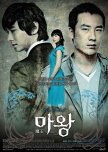
The show invests considerable narrative energy into constructing characters that exist not merely as archetypes but as embodiments of conflicting motivations, a fact that requires viewers to engage beyond passive consumption. Satoshi Ohno’s portrayal of a figure oscillating between the shadows of vengeance and the fragile light of redemption is not simply a performance; it is a deliberate challenge to conventional heroism. Similarly, Toma Ikuta’s role serves less as foil and more as a mirror, reflecting the complexity and duality inherent in the drama’s moral universe.
One could easily praise the script’s refusal to succumb to tidy resolutions, embracing instead a cadence of tension and uncertainty that mirrors real human conflict. Yet, beneath this narrative ambition lies a broader commentary on justice and identity, questions that the drama raises without pretense, allowing the viewer to wrestle with them without didactic guidance.
Critics might point to the dense layering of symbolism and the deliberate pacing as barriers to immediate gratification, but to do so would miss the point entirely. The show’s insistence on depth over simplicity, on atmosphere over action, resists the typical transactional relationship between viewer and entertainment. Maou demands reflection, not mere distraction.
In this way, Maou transcends its genre, becoming not just a thriller, but an exploration of the psychological landscapes that define us. It is a work that neither panders nor placates, instead engaging the audience in a dialectic on the nature of good and evil, of power and vulnerability.
For those willing to embrace its challenge, Maou offers a rare and rewarding journey. It is a drama that refuses complacency, embodying a narrative rigor that few productions dare to attempt. To engage with Maou is to engage with storytelling at its most intellectually and emotionally resonant.
Was this review helpful to you?

At its core, Painted Skin is a meditation on the fragility of identity and the destructive nature of longing. The film’s central characters are not defined by their external appearances but by the emotional scars they carry within them. It is a story of transformation, but not in the conventional sense. The transformations here are not merely physical, they are psychological and emotional, as the characters grapple with the masks they wear, both literally and figuratively.
The film’s central character, the fox spirit, embodies the deep conflict between what one desires and what one must sacrifice to achieve it. The psychological complexity of the fox spirit’s journey is not that of an evil creature, but of a being tormented by an insatiable hunger—for love, for acceptance, for connection. Her struggle is a poignant reminder of the danger in seeking fulfillment at the expense of one's own humanity. Her desire for human love transcends mere attraction, it becomes an existential craving that pushes her toward destruction, and yet, her vulnerability invites empathy. She is both predator and prey, trapped in the web of her own desires.
This duality between desire and sacrifice, between love and destruction, is reflected in the human characters as well. The warrior, torn between duty and love, and the princess, caught between loyalty and her own yearning for something deeper than mere obligation, both embody the tension between social roles and personal truth. They are complex, multi-layered individuals whose emotional journeys unfold with heartbreaking authenticity. Their internal struggles are portrayed not as melodramatic outbursts, but as subtle, almost imperceptible shifts, quiet moments of recognition that speak volumes about the intricacies of human longing.
The film’s pacing, deliberate and contemplative, allows these emotional complexities to settle and breathe. It is not a fast-moving narrative driven by spectacle, but a slow, deliberate unfolding that invites the audience to reflect on the characters’ innermost motivations. Every moment of hesitation, every quiet glance between characters, speaks volumes about the deep emotional currents flowing beneath the surface. These moments are not merely dramatic devices; they are the emotional heart of the film.
What makes Painted Skin so emotionally resonant is its exploration of the masks we wear to protect ourselves from vulnerability. The supernatural elements of the story, the fox spirit’s ability to shed her human skin—become a powerful metaphor for the way people hide their true selves. Each character is trapped in a form of self-deception, afraid to confront their true desires or fears. The cost of this deception is not just personal, but relational, as it leads to heartbreaking misunderstandings and betrayals. In this way, Painted Skin reveals that the most terrifying thing is not the otherworldly monster, but the fragile human heart, susceptible to fear, doubt, and unacknowledged pain.
The performances in Painted Skin are quietly extraordinary in their emotional depth. The fox spirit’s portrayal is particularly notable for its nuanced balance between strength and fragility. There is an otherworldly beauty in her presence, but beneath it lies an aching loneliness that makes her tragic fate all the more poignant. The human characters, too, are portrayed with a remarkable subtlety, each actor capturing the complexity of their emotional landscapes. It is not just the external conflicts that drive them, but the internal battles—the fear of being unworthy of love, the fear of losing oneself in the process of loving another.
The philosophical depth of Painted Skin lies in its exploration of what it means to be human. The film asks difficult questions about the nature of love and desire, how we chase after that which we think will complete us, only to find that the price of that completion may be too high. It also delves into the idea of identity as something fluid, something that can be shaped and reshaped by our experiences, desires, and the people we love. In this way, the film subtly critiques the notion of a "fixed" self, suggesting that identity is not something we find, but something we must continuously negotiate and redefine.
At its most philosophical, Painted Skin is a film about transformation, not just in a supernatural sense, but in a deeply human one. It explores the idea that the masks we wear, whether to protect ourselves or to hide our darkest desires—can lead to profound consequences. The film suggests that true freedom comes not from becoming someone else, but from embracing the complexity of who we already are.
For all its otherworldly elements, Painted Skin is a deeply human film, a reflection on love, loss, and the masks we wear to protect ourselves from the world and from each other. It asks us to look beyond the surface, beyond the external beauty, and to confront the raw, unspoken truths that lie beneath. It is a film that lingers with you, not just because of its striking visuals or its supernatural intrigue, but because it dares to ask the hardest questions about the human heart and the nature of love.
Was this review helpful to you?

At its core, the film is less about demons and princesses and more about the desperate negotiations we make to feel worthy, of love, of attention, of ourselves. Zhou Xun’s Xiaowei, a fox spirit yearning for a human heart, gives the film its spiritual anchor. Her longing is never played as monstrous; instead, it's heartbreakingly familiar, a desire to be accepted, to feel pain, to be loved without condition. Zhou’s performance is mesmerizing not for its theatricality, but for its restraint. Her quiet devastation lingers long after the scene has ended.
Opposite her, Zhao Wei’s Princess Jing is the emotional centerpiece. Disfigured by a bear attack and hiding behind a golden mask, Jing’s journey is one of internal collapse and fragile defiance. Her love for General Huo (Chen Kun) is complicated by pride, shame, and a growing awareness that her scars, physical and emotional — define her in the eyes of others far more than they should. Zhao Wei brings rawness to a role that could have easily slipped into melodrama. Her pain is palpable, but so is her dignity.
And yet, for all this emotional potential, the film doesn't always trust itself to stay grounded in it. There is a tendency to lean on spectacle, ornate battle sequences, CGI-enhanced landscapes, and secondary plotlines that dilute rather than deepen the central conflict. The love triangle, while thematically rich, sometimes feels structurally uneven. Chen Kun’s portrayal of General Huo, though sincere, never quite reaches the emotional clarity of the women around him. His character is asked to carry too much symbolic weight and too little personal nuance.
The film also falters in its tonal shifts, particularly in the inclusion of comedic side characters and mythic subplots that feel imported from a different kind of story. These moments break the spell, drawing attention to the artifice in a film that otherwise strives for emotional authenticity.
Still, when Painted Skin: The Resurrection slows down, when it lets two women sit in silence, measuring their worth against the love of the same man, or when it allows a demon to quietly yearn for the impossible, it becomes something more than a fantasy. It becomes a mirror for how we see ourselves, and how cruelly we can love one another when we’re afraid we are unlovable.
It is not flawless, structurally uneven and occasionally overreaching but its heart beats loudly through the gold and ice. For those drawn to stories where love is as much about pain as passion, Painted Skin: The Resurrection offers a beautifully rendered, emotionally resonant experience. One that lingers not because it is perfect, but because it dares to be vulnerable.
Was this review helpful to you?

What distinguishes *Lucifer* is not merely the tension of its plot, though the intricate cat-and-mouse dynamics are compelling, but the rigor with which it interrogates the interior lives of its characters. In the long, carefully constructed pauses between dialogue, the emotional stakes become palpable: the cost of obsession, the weight of grief, the fragile line that separates moral certainty from self-destruction.
Uhm Tae-woong’s Detective Choi Dong-chul is a study in layered human complexity. His pursuit of justice is relentless, yet it is haunted by personal loss, doubt, and quiet self-reproach. He inhabits the screen with a tension that feels lived-in, fragile, and profoundly human. Opposite him, Shin Hyun-joon’s Jang Sae-hee is a figure of measured control, a presence that is both magnetic and morally disquieting. His intelligence and composure are inseparable from the shadows of his past, making every decision, every subtle gesture, a meditation on guilt and consequence.
The series’ tension is cultivated not through constant action, but through anticipation, through the meticulous observation of human behavior under pressure. Glances, silences, and the subtlest of behavioral cues carry meaning, revealing the unspoken negotiation between hunter and hunted, between those who enforce justice and those who redefine it. The visuals and soundtrack reinforce this atmosphere: a city of dim corridors and shadowed interiors mirrors the moral uncertainty of the narrative, while music never manipulates, only amplifies the emotional resonance of each scene.
The conclusion is stark, unavoidable, and honest. *Lucifer* refuses to reward attachment with neat closure, instead presenting consequences that feel inevitable, earned, and, in their quiet devastation, profoundly human. It is a finale that underscores the series thematic preoccupations: obsession as destiny, justice as burden, and the complex architecture of morality.
*Lucifer* is not without its imperfections, certain plot threads meander, some twists are foreseeable, but its greatest achievement lies in its emotional and psychological acuity. It is a drama of interiority as much as action, of consequence as much as plot, and of the fragile human impulses that define us all.
Was this review helpful to you?

What distinguishes Shōgun is not merely the scope of its production, though the meticulous attention to historical and aesthetic detail is undeniable, but the rigor with which it interrogates the spaces between characters: spaces of mistrust, of obligation, of restrained violence. In these silences, in the long, deliberate pauses between dialogue, the true stakes of the drama unfold. The series does not pursue tension through action, but through anticipation, through the omnipresent sense that any misstep, verbal, cultural, or moral, could be fatal.
Hiroyuki Sanada’s Toranaga stands as a figure of extraordinary calculation: a man who understands that power, in its purest form, is exercised not through force, but through the careful withholding of it. Sanada does not portray Toranaga so much as inhabit him, rendering his presence a study in layered intentionality. Every gesture, every word, seems to carry the weight of consequence. His performance is not emotionally demonstrative, yet it resonates with a kind of restrained intensity that is far more telling than overt displays of authority.
Opposite him, Cosmo Jarvis’s Blackthorne becomes a vessel for both narrative momentum and thematic reflection. His foreignness is not played for spectacle, but for disorientation, a man unmoored not only from his homeland but from his own frameworks of understanding. The series wisely does not allow him the comfort of a redemptive arc or the illusion of mastery. His is a story of continual misinterpretation, of learning that assimilation may not mean understanding, and that survival often requires surrender, not triumph.
Anna Sawai’s Mariko is perhaps the series’ most quietly devastating presence, a character who navigates the rigid constraints of her social position with both dignity and fatalism. Her emotional restraint, like much of the series, functions as a double narrative: one of service and one of subversion. Her choices are often silent acts of resistance, her fate a commentary on the limits of agency within structures designed to suppress it.
Where many historical dramas seek to render the past legible to the present, by imposing contemporary sensibilities or moral clarity, Shōgun instead leans into the opacity of its world. It asks the viewer not to decode or judge, but to sit with the discomfort of not fully knowing. Political strategies unfold like ritual, alliances shift beneath layers of etiquette, and meaning itself becomes a negotiation. It is a series deeply concerned with language, not just spoken, but implied, withheld, misunderstood.
Critics may find its pacing deliberate, even withholding. But to demand immediacy from Shōgun is to misapprehend its design. It is not a series meant to gratify; it is a work that compels attention, that rewards patience, and that challenges the viewer to embrace narrative ambiguity as a reflection of the human condition.
In the end, Shōgun (2024) transcends the expectations of its genre, offering not just a historical epic but a meditation on cultural collision, political performance, and the impossibility of absolute understanding. It is a drama of silence and space, of ritual and rupture, a work that does not merely depict history, but engages in the act of historical thinking. For those willing to meet it on its own terms, Shōgun offers not just spectacle, but substance. Not just story, but structure.
Was this review helpful to you?

Sur le plan visuel et thématique, le film honore ses racines avec un soin attentif aux détails, la chorégraphie ne se réduit pas à des combats spectaculaires, mais devient un langage corporel qui traduit la lutte intérieure et l’évolution de Mulan. L’univers du film paraît authentique, vivant, et cette authenticité invite à une connexion émotionnelle plus profonde que beaucoup d’autres adaptations.
Il est vrai que certains passages pâtissent d’un rythme parfois ralenti, sous le poids de l’ambition de concilier fidélité historique et exigence cinématographique. Pourtant, ces temps plus calmes laissent place à la réflexion, permettant au spectateur de souffler avec Mulan, de ressentir la solitude derrière son courage, et l’incertitude qui sous-tend sa détermination.
Au final, ce Mulan ne parle pas d’un héroïsme parfait ou mythique, mais bien de la complexité humaine, avec ses doutes et ses failles, qui pousse à se relever, même quand le chemin est obscur. Cette honnêteté en fait un film subtilement puissant, qui reste longtemps en mémoire après le générique.
Was this review helpful to you?

Des personnages d’une rare complexité Le véritable cœur de la série n’est ni l’intrigue politique, ni la romance. C’est l’étude de deux personnages brillants, brisés, et irrémédiablement liés. Feng Zhiwei (Ni Ni) : Intelligente, mesurée, lucide, un personnage féminin qui n’a pas besoin d’être idéalisé pour captiver. Son parcours est une montée silencieuse, une prise de pouvoir méthodique, sans jamais sacrifier sa dignité. Ning Yi (Chen Kun) : Stratège redoutable, héritier blessé, prince imprévisible. Sa performance ne cherche pas à plaire, mais à dominer l’écran, et elle y parvient. Leur relation n’est pas une romance au sens traditionnel. C’est une lutte d’égal à égal, un respect mutuel qui évolue vers quelque chose de plus profond, de plus douloureux, de plus vrai.
Une lenteur assumée, jamais gratuite Beaucoup qualifieront cette série de "lente". Ils auront raison — mais ce serait une erreur de voir cela comme un défaut. Cette lenteur est une stratégie narrative. Elle donne du poids au silence, de l’importance aux regards, de la crédibilité aux choix politiques et émotionnels des personnages. Ici, la tension naît de la retenue, et l’émotion ne jaillit pas : elle s’accumule, jusqu’à l’inévitable rupture.
Une œuvre d’art visuelle et sonore Chaque plan est une peinture. Chaque costume, une déclaration. Chaque composition visuelle a un sens narratif. Rien n’est laissé au hasard, et surtout pas la beauté. Le travail de William Chang (direction artistique et costumes) mérite d’être salué. Cette série est esthétiquement l’une des plus abouties jamais produites en Chine. La musique, quant à elle, ne souligne jamais les émotions, elle les enveloppe, subtilement, comme un écho lointain.
Un final impitoyable, fidèle à sa logique Oui, la fin divise. Elle déstabilise parce qu’elle ne cherche pas à rassurer. Elle ne récompense pas l’attachement du spectateur avec un “happy end” facile. Elle le confronte aux conséquences, à la douleur, à la réalité du pouvoir. C’est une conclusion tragique, mais nécessaire. Et surtout, cohérente avec tout ce que la série a construit pendant plus de 70 épisodes.
Conclusion The Rise of Phoenixes n’est pas un divertissement léger. C’est une œuvre exigeante, ambitieuse et profondément maîtrisée. Elle ne plaira pas à tout le monde, et c’est précisément ce qui la rend si précieuse. Ce n’est pas un drame qui cherche à être aimé. C’est un drame qui cherche à être grand. Et il y parvient.
Revoir ? Absolument. Pas pour comprendre ce que j'ai manqué, mais pour admirer ce que la série n’a jamais raté.
Was this review helpful to you?

The series can be slow, even meandering, but those pauses let the small moments, glances, silences, small betrayals, land with weight. Its moody visuals and understated music perfectly echo the tension and melancholy that define the story. The ending is stark and inevitable, refusing easy comfort, but it feels earned, painfully so.
Ouroboros isn’t perfect. It falters in pacing and occasionally leans on clichés. Yet in its best moments, it captures something rare: friendship as destiny, loyalty as both gift and curse. A flawed, yet deeply memorable drama.
Was this review helpful to you?

En lugar de centrarse en la acción o en la resolución, la serie construye su tensión a través de la conversación, la ambigüedad y el lento desentrañar de motivos ocultos. Rehúye las respuestas fáciles, prefiriendo la reflexión al cierre. Aunque este enfoque intelectual resulta refrescante, también puede volverse repetitivo, y el ritmo pausado puede poner a prueba la paciencia de quienes buscan más dinamismo.
Aun así, Don’t Call It Mystery es discretamente ambiciosa. Invita a escuchar con más atención: a sus personajes, a sus temas, y a las preguntas que se niega a responder por ti. No es perfecta, pero sí estimulante.
Was this review helpful to you?



